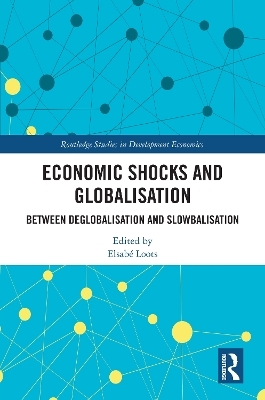
Economic Shocks and Globalisation
Routledge (Verlag)
978-1-032-60765-8 (ISBN)
Over the 153-year period since 1870, the phenomenon of globalisation has been shaped and reshaped. As we look back at the events that shaped our understanding of the process and its momentum before and after the Global Financial Crisis (GFC), it became clear that the process of globalisation has changed and continues to evolve, which requires a deeper analysis. The book answers the question of why the performance of the hyper-globalisation period has not continued during the post-GFC period after 2010, and what might be expected going forward. Apart from the fact that the fourth globalisation wave period between 2010 to the early 2020s has been characterised by a range of global shocks that caused more volatility, instability, and uncertainty, the major economic determinants of globalisation have also slowed markedly. The outbreak of the COVID-19 pandemic, followed by the geopolitical uncertainty and instability all caused global contagion effects around the world, with economic, socio-economic, and geopolitical consequences and responses.
This book aims to analyse most of these global events and shocks and attempted to gather a deeper understanding of the present drivers of globalisation and what the major trends and shifts are geo-economically, socio-economically, and geopolitically. The conclusions drawn include that globalisation remains, despite the current slowbalisation, an integrated process that is globally entrenched, yet complex, cyclical, multifaceted and multiplex.
This book is aimed at academics in economics, political sciences, social sciences, and may also find an audience among international policymakers and scholars at multilateral institutions such as the World Bank and the United Nations.
Elsabé Loots is a Professor of Economics at the University of Pretoria, South Africa.
Part I: The globalisation debate: How did we get here? 1. The history of globalisation: How did we get here? Part II: Geo-economic and socio-economic perspectives on globalisation 2. The evolving dynamics of global economic governance in the 21st century 3. Globalisation and changing patterns in global capital flows 4. Foreign direct investment and job creation in host countries: A comparative study of Chinese and advanced-economy multinational enterprises 5. Trade, regionalism and global value chains: Major global shifts? 6. Globalisation and income inequality: Evidence from advanced, emerging and least developed countries 7. Globalisation pathways: Insights from developed and developing countries Part III: Geopolitical perspectives on globalisation 8. The rise of multiplexity and a future of world order/s 9. Challenges to representative democracy and the liberal international order 10. The geopolitics of energy and globalisation Part IV: Facing the future of globalisation 11. Whereto with globalisation?
| Erscheinungsdatum | 10.07.2024 |
|---|---|
| Reihe/Serie | Routledge Studies in Development Economics |
| Zusatzinfo | 22 Tables, black and white; 30 Line drawings, black and white; 30 Illustrations, black and white |
| Verlagsort | London |
| Sprache | englisch |
| Maße | 156 x 234 mm |
| Gewicht | 700 g |
| Themenwelt | Sozialwissenschaften ► Soziologie ► Spezielle Soziologien |
| Wirtschaft ► Volkswirtschaftslehre ► Makroökonomie | |
| Wirtschaft ► Volkswirtschaftslehre ► Wirtschaftspolitik | |
| ISBN-10 | 1-032-60765-3 / 1032607653 |
| ISBN-13 | 978-1-032-60765-8 / 9781032607658 |
| Zustand | Neuware |
| Haben Sie eine Frage zum Produkt? |
aus dem Bereich


